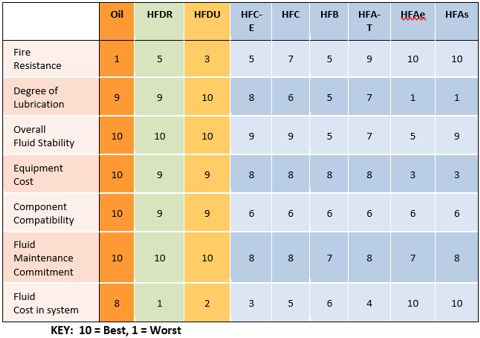Blog
The Ultimate Guide to Hydraulic Oil: Types, Characteristics, and Applications

The Ultimate Guide to Hydraulic Oil: Types, Characteristics, and Applications
Estimated reading time: 10 minutes
Key takeaways:
- Hydraulic oil is crucial for power transmission and lubrication in hydraulic systems
- Various types of hydraulic oils cater to different industrial needs
- Key characteristics like viscosity and oxidation stability ensure optimal performance
- Applications span across manufacturing, construction, agriculture, and marine industries
Table of contents:
- Introduction
- Types of Hydraulic Oil
- Characteristics of Good Hydraulic Oil
- Uses of Hydraulic Oil in Machinery
- Factors to Consider When Choosing the Best Hydraulic Oil
I. Introduction
Hydraulic oil is a specialized oil designed for power transmission and lubrication in hydraulic systems. It plays a crucial role in various industries, including manufacturing, construction, and agriculture. The primary purpose of hydraulic oil is to transfer power, control motion, and lubricate components in machinery and equipment.
[http://www.hydraulicshydraulics.org/Hydraulics/Oil/Main_Oil_Home.htm]II. Types of Hydraulic Oil
A. Mineral oil-based hydraulic fluids
Mineral oil-based hydraulic fluids, derived from petroleum, are the most common type of hydraulic oil. They are cost-effective and suitable for general industrial applications.
[https://www.exxonmobil.com/en/businesses/lubricants/products/hydraulic-oils/minerals]B. Synthetic hydraulic fluids
Synthetic hydraulic fluids are engineered to provide extreme temperature performance and improved oxidation resistance. They are ideal for high-stress applications and harsher environments.
[https://www.shell.com/business-customers/lubricants/products/hydraulic-oils/synthetic.aspx]C. Biodegradable hydraulic fluids
Biodegradable hydraulic fluids are an environmentally friendly option that minimizes ecological impact. They are suitable for sensitive applications and outdoor equipment.
[https://www.total.com/en/businesses/industrial-lubricants/products/hydraulic-fluids/biodegradable-hydraulic-fluids]D. Water-glycol hydraulic fluids
Water-glycol hydraulic fluids are fire-resistant and used in high-risk environments. They maintain performance in wet conditions and demanding applications.
[https://www.chevronlubricants.com/en/product-category/hydraulic-oil/water-glycol]III. Characteristics of Good Hydraulic Oil
A. Viscosity
Viscosity determines a fluid’s resistance to flow at operating temperatures. Proper viscosity ensures optimal lubrication and system performance.
[https://www.astm.org/ standards/d445.html]B. Viscosity index
The viscosity index measures an oil’s ability to maintain viscosity across temperature ranges. A high viscosity index ensures stable performance in varying conditions.
[https://www.iso.org/standard/52664.html]C. Pour point
The pour point is the lowest temperature at which oil remains fluid. It is crucial for cold climate operations and startup performance.
[https://www.din.de/en/din-standards/standards-listings/standard-detail/page/4029585]D. Flash point
The flash point is the temperature at which oil ignites. A high flash point ensures safety in high-temperature applications.
[https://www.sae.org/standards/content/j357_201606/]E. Oxidation stability
Oxidation stability resists chemical breakdown under heat and oxygen exposure. It extends oil life and reduces maintenance requirements.
[https://www.ipquality.co.uk/en/standards/test-methods.html]F. Foam resistance
Foam resistance prevents air entrainment and ensures consistent hydraulic performance. Quality hydraulic oil remains stable under pressure and motion.
[https://www.iso.org/standard/55337.html]IV. Uses of Hydraulic Oil in Machinery
A. Industrial machinery
Heavy-duty industrial machinery, such as presses, forging machines, and injection molders, rely on hydraulic fluid for machines to ensure smooth operation and precise control in manufacturing processes.
[https://www.parker.com/na/en/repository/Hines%20Fender%20Case%20Study.pdf]B. Mobile equipment
Excavators, cranes, and loaders depend on hydraulic oil for various functions, enabling powerful and precise movements in construction and heavy equipment.
[https://caterpillar-live.com/content/caterpillar/com/en_cat/literature/operatormanuals/650ma.html]C. Agricultural machinery
Tractors, sprayers, and harvesters use hydraulic systems for implements, allowing efficient control of tasks like lifting, steering, and harvesting.
[https://www.deere.com/en/products/equipment/agricultural-tractors/4105r/]D. Marine applications
Hydraulic steering systems and deck machinery depend on oil performance to ensure smooth operation and reliability in challenging marine environments.
[https://www.shell.com/business-customers/lubricants/products/hydraulic-oils/lm-series.aspx]V. Factors to Consider When Choosing the Best Hydraulic Oil
A. Operating temperature range
When selecting the best hydraulic oil, choose one that performs well within the system’s temperature extremes to ensure proper lubrication and protection.
[https://www.nfpa.com/Research-and-Resources/Hydraulics/Resources.aspx]B. Machine requirements
Match oil properties to specific system needs, considering factors like pressure, speed, and duty cycle for optimal performance.
[https://www.machineryshandbook.com/]FAQ
What is the main purpose of hydraulic oil in systems?
The primary purpose of hydraulic oil is to transfer power, control motion, and lubricate components in hydraulic systems and machinery.
What are the most common types of hydraulic oils?
The most common types include mineral oil-based fluids, synthetic fluids, biodegradable fluids, and water-glycol fluids.
How often should hydraulic oil be changed?
Hydraulic oil change intervals depend on usage, environmental conditions, and oil type. Consult manufacturer guidelines for specific recommendations.

